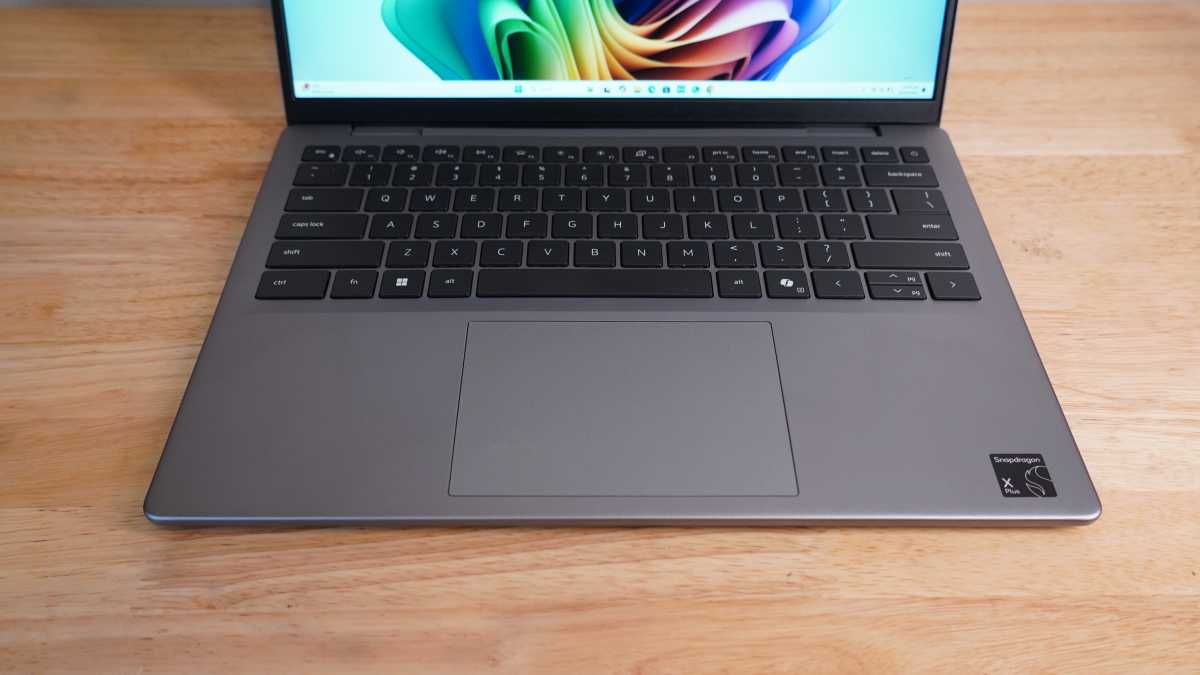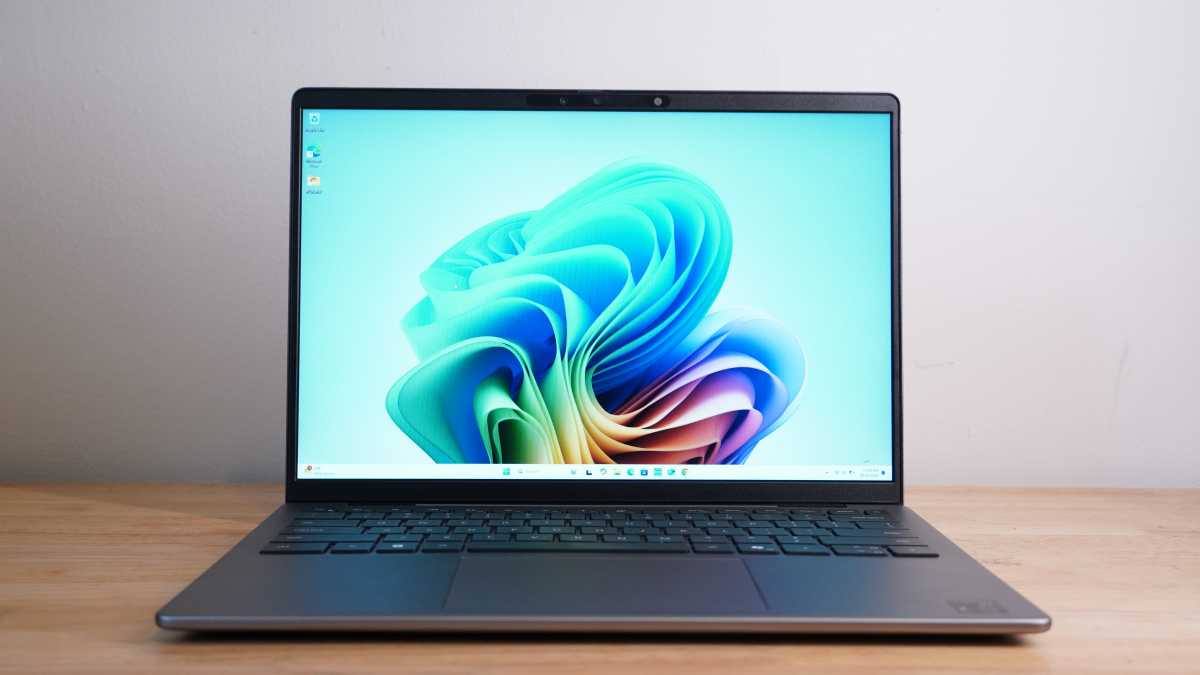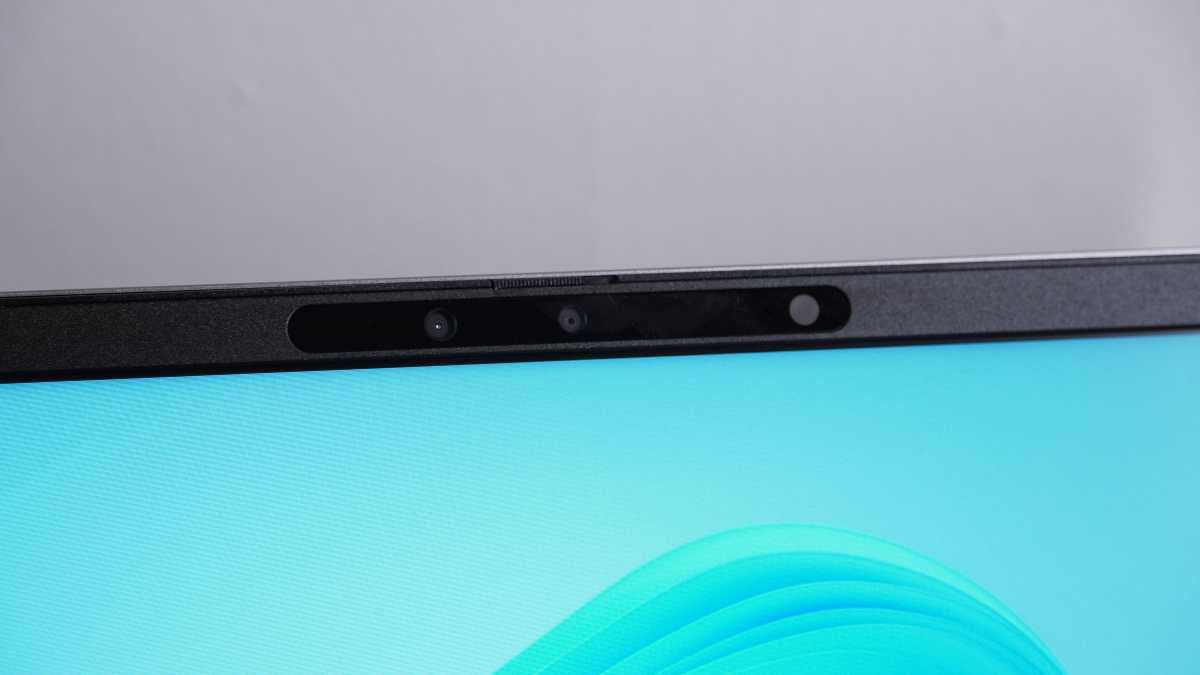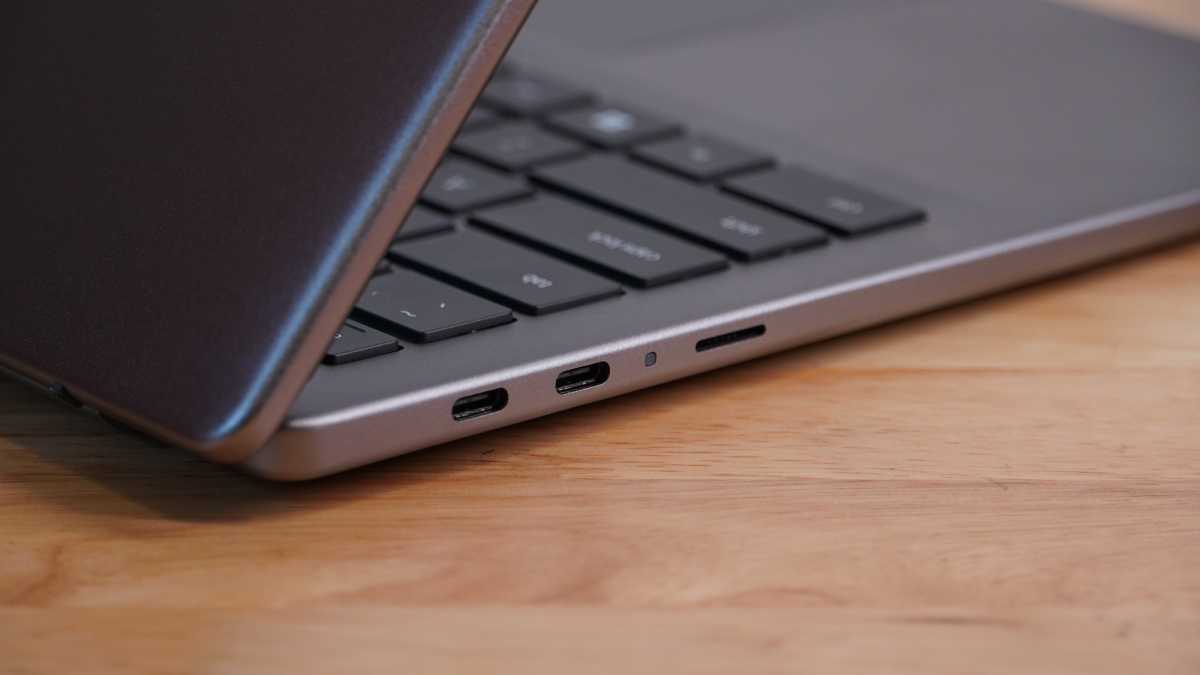Dell Inspiron 14 review: Pinning too much hope on a low-tier Snapdragon chip
- Solid connectivity options
- Easily viewable display
- Windows Hello facial recognition
- Performance lags behind x86 systems
- Battery-life isn’t a standout
- Bland display and design
The choice to switch to a Qualcomm SoC should have come with some advantage over other systems, but our testing couldn’t really find one.
Price When Reviewed
This value will show the geolocated pricing text for product undefined
Best Pricing Today
Price When Reviewed799
Best Prices Today: Dell Inspiron 14 Retailer Price $749
View Deal
$749
View Deal
 $799.99
View Deal
Price comparison from over 24,000 stores worldwide
Product
Price
Price comparison from Backmarket
$799.99
View Deal
Price comparison from over 24,000 stores worldwide
Product
Price
Price comparison from Backmarket
The Dell Inspiron 14 (5441) is yet another iteration of a machine that’s seen many in the past year. This one changes very little outwardly. It shifts a few ports and vents, and it swaps facial recognition in place of a fingerprint reader. The bigger change is under the hood, where the Dell Inspiron 14 has switched over to an ARM chip from Qualcomm.
There’s been a lot of excitement around these chips, and the Dell Inspiron 14 has put one on offer with a starting price of $749. That said, Dell chose the weakest Snapdragon X Plus chip of the bunch and did little else to make this laptop truly shine, leaving little reason to consider it over the many other quality laptops you can find near its price, including Dell’s own excellent Inspiron 14 Plus.
Further reading: Best laptops 2024: Premium, budget, gaming, 2-in-1s, and more
Dell Inspiron 14: Specs and features- Model number: 5441
- CPU: Qualcomm Snapdragon X Plus X1P-42-100
- Memory: 16GB LPDDR5x
- Graphics/GPU: Adreno X1-45 Graphics
- Display: 14-inch 1200p IPS
- Storage: 512GB PCIe Gen4 SSD
- Webcam: 1080p + IR
- Connectivity: 2x USB4 Type-C with Power Delivery and DisplayPort Alternate Mode, 1x USB 3.2 Gen 1 Type-A, 1x MicroSD card reader, 1x 3.5mm combo audio
- Networking: Qualcomm FastConnect7800 WiFi 7, Bluetooth 5.4
- Biometrics: Windows Hello facial recognition
- Battery capacity: 54 watt-hours
- Dimensions: 12.36 x 8.81 x 0.7 inches
- Weight: 3.3 pounds
- MSRP: $799 as-tested ($749 base)
This laptop does little to differentiate itself from the many Inspiron permutations that have come before it. It bears more than a little resemblance to the Inspiron 14 Plus I tested earlier this year. And even though this isn’t a Plus mode, it gets the classier touch with a sturdy aluminum chassis all around. It’s not overly thick at 0.7 inches nor overly heavy at 3.3 pounds. It could certainly be more svelte, but it’s meeting expectations for a sub-$1,000 laptop.
Despite the more premium build, The Inspiron 14 still ends up looking rather bland. It’s all silver save for the black plastic of the keyboard and display bezel, which date the design a bit. The frame is nicely rounded and doesn’t make any major design statements.
The hinge takes a small step away from basic by being of the sort that lifts that back edge of the laptop when opened beyond 90-degrees. While this can improve typing ergonomics, the trade off is less comfort when using the laptop on a lap, where the back edge of the display will add pressure to the thighs.
The bottom of the laptop sits on two small rubber feet at the front and one wide one at the back. There are two small slits for the speakers near the front of the laptop, and there’s a grate for airflow. Curiously, the grate doesn’t line up all that well with the fan inside the Inspiron 14, which could impact its efficacy.
Dell Inspiron 14: Keyboard, trackpad
IDG / Mark Knapp
The Inspiron 14’s keyboard is uninspired and yet, at the same time, quite capable. The keycaps offer just enough stabilization and resistance to provide a firm platform for typing. So even though the keyboard doesn’t have a particularly memorable feel, it’s more than up to the task of snappy typing.
With just an hour or so of using the laptop, I was already able to get my typing speed up to 118-words-per-minute with 96 percent accuracy in Monkeytype. I’d love to see a little more contour to the key caps, as I find most of my typos come from reaching the edge of the flat keycaps, which are hard to feel out. The keys include basic white backlighting that effectively illuminates all of the legends.
The trackpad is nothing too special. It’s plenty smooth and reasonably large, though not quite as wide as it could be. It’s enough for even large hands, but there are certainly better out there. It has a somewhat deep physical click, which proved largely consistent in my testing.
The keycaps offer just enough stabilization and resistance to provide a firm platform for typing. So even though the keyboard doesn’t have a particularly memorable feel, it’s more than up to the task of snappy typing.
Dell Inspiron 14: Display, audio
IDG / Mark Knapp
If you love a quality display, don’t get too excited. It’s a big letdown with just 65 percent coverage of the sRGB color space and 50 percent of the DCI-P3 color space. This makes content of all sorts look decidedly bland even with its 1690:1 contrast ratio.
The display gets reasonably bright with a 370.9-nit peak brightness, and that combines well with a matte finish for easy visibility even in un-ideal conditions. But compared to the Dell Inspiron 14 Plus, it’s an all-around downgrade. That laptop hit 79 percent DCI-P3 coverage, a 418-nit peak brightness, and boasted a higher resolution.
The Inspiron 14’s speakers are a mixed bag as well. They fire out the bottom of the laptop, and this can leave them sounding a bit boxed in depending on the surface they’re set on, especially when listening at high volumes.
High volumes also come with a bit of reverberation in the chassis, making for harsher listening. At lower volumes, the speakers are rather satisfying, offering a touch of bass depth alongside bright and clear mids, higher frequencies aren’t well done, coming through as more of a high-pitched sibilance. This matters less for dialogue but hurts music.
Dell Inspiron 14: Webcam, microphone, biometrics
IDG / Mark Knapp
The Inspiron 14 offers just a 1080p webcam, but it does surprisingly well. In a modestly lit room, it managed to capture bright and clear visuals without noticeable noise. The footage also didn’t struggle with exposure. The ability to capture enough light helps significantly with sharpness as well, as even sharp high-resolution cameras that need to resort to high ISO settings will end up with so much digital noise that their visuals end up soft and grainy. When you’re not using the camera, there’s a physical shutter that flips over the sensors above the display.
The webcam also provides helpful Windows Hello facial recognition for quick sign-ons and biometric authentication. Though the keyboard layout is similar to other Dell laptops with fingerprint scanners, the Inspiron 14 doesn’t get one.
The microphone does its job well, capturing my voice clearly while easily subduing light background noise.
Dell Inspiron 14: Connectivity
IDG / Mark Knapp
The Dell Inspiron 14 is at least on point when it comes to connectivity. It’s not compromising on connection quality with two USB4 Type-C ports capable of some serious bandwidth, display output, and power. Splitting these ports between each side would have been nice, but instead Dell situated both on the left edge alongside a microSD card reader. The right side of the laptop includes a USB 3.2 Gen 1 Type-A port and a 3.5mm headphone jack, giving the Inspiron 14 a quick leg up on even XPS models when it comes to wired connections.
With a Qualcomm chipset inside, the Inspiron 14 gets Qualcomm FastConnect7800 Wi-Fi 7, which has been plenty fast and stable in my testing. It also gets a more recent Bluetooth 5.4 connection.
Dell Inspiron 14: PerformanceThe Dell Inspiron 14 isn’t promising to be a performance beast built around the Qualcomm Snapdragon X Plus X1P-42-100 — the lowest-tier chip in Qualcomm’s lineup. I’ve already seen Qualcomm’s higher-tier chips struggling to keep up with Intel and AMD chips when emulation is required, and the Inspiron 14’s chip has even less horsepower available to help it keep up.
Sure enough, whether it’s single- or multi-core performance, the Inspiron 14 struggles to keep up with the $999 Dell Inspiron 14 Plus and $849 Asus Zenbook 14 OLED in Cinebench R23, Cinebench R20, and Cinebench R15, all of which don’t run natively on ARM. Even the $749 Acer Aspire Vero 16’s relatively weak Intel Core Ultra 5 125U chip outperformed the Dell in these tests.
That’s something of a tough spot for the Inspiron 14 to be in, as it’s not like the CPU is bad. In fact, when it gets to run a native app, the tides can turn. Other systems that it loses to in Cinebench R23, like the Lenovo Yoga 9i 14 Gen 9 and Acer TravelMate P4, and up falling behind it in Cinebench R24, which runs natively on ARM.
The problem is the variably performance can lead to an inconsistent experience. Plus, it’s not like the Inspiron 14 will always turn the tides, as it still loses to the Dell Inspiron 14 2-in-1 7445, and therefore very likely still would lag behind the ASUS Zenbook 14 OLED which runs the same chip.
To the Inspiron 14’s credit, it does run the Snapdragon X Plus X1P-42-100 faster than the Asus ProArt PZ13 ran it, but that was a compact tablet and the Inspiron 14 is a sizable laptop.
Graphics performance also isn’t a strong point for the Dell Inspiron 14. In Time Spy, it struggles to keep up with even the basic Intel Graphics found inside the Acer Aspire Vero. And next to both Intel Arc Graphics and AMD Radeon 780M graphics, it’s no contest.
3DMark’s Night Raid benchmark is a slightly different story. It was designed with ARM systems in mind, and sure enough, the Dell Inspiron 14 ends up performing better. Both the Inspiron 14 and Asus ProArt PZ13 manage to leap ahead of the Acer Aspire Vero 16 and its Intel Graphics. But they still don’t come close to scratching the performance of Intel Arc Graphics in the Dell Inspiron 14 Plus or AMD Radeon 780M graphics in the Asus ZenBook 14 OLED.
The Inspiron 14 also experiences a hiccup I’ve encountered on many Windows systems with weak integrated graphics. While streaming video, it will occasionally stall all video updates to the screen, appearing to have completely frozen. The system remains responsive, however, and quickly minimizing all windows restores everything. But a simple fix doesn’t erase the fact that the Inspiron 14 is experiencing a glitch that shouldn’t happen in the first place.
Dell Inspiron 14: Battery lifeBattery life is the great refuge for low-performance systems, and as good as the Inspiron 14 manages to be, it doesn’t stand out. It’s efficient, managing to run for over 17 hours on average in our local 4K video playback benchmark with just a 54-watt-hour battery. But many Windows machines have stepped up to the plate recently.
In fact, the Dell Inspiron 14 Plus managed the same result down to the minute, and yet its performance is better in just about every way. It’s a similar story for the Asus Zenbook 14 OLED, which only ran a few minutes less in our battery test but had so much more to offer in other respects.
In regular use with browsing and some streamed video playback, the Inspiron 14 offered a bit over 8 hours of runtime. This is considerably different from its video playback runtime, but not unexpected.
Dell Inspiron 14: ConclusionYou can do a lot worse than the Dell Inspiron 14. It’s a classy, if bland, looking machine that’s got plenty to offer in terms of connectivity and easy utility. But it’s just not quite all it could have been. Dell shifted over to a low-tier Snapdragon X Plus chip for this model, and the performance left plenty to be desired. As long as emulation is required, you’ll end up better off with even some of Intel’s less-loved CPUs, and graphics lags behind thoroughly.
Factor in a very disappointing display and the fact that even the low-power processor couldn’t set the Dell Inspiron 14 apart from the competition in battery life, and you’ve got a laptop that has no easy time justifying itself over others.
